Helsinki,
Finland
Story
written
by Rick Archer
November 2012
|
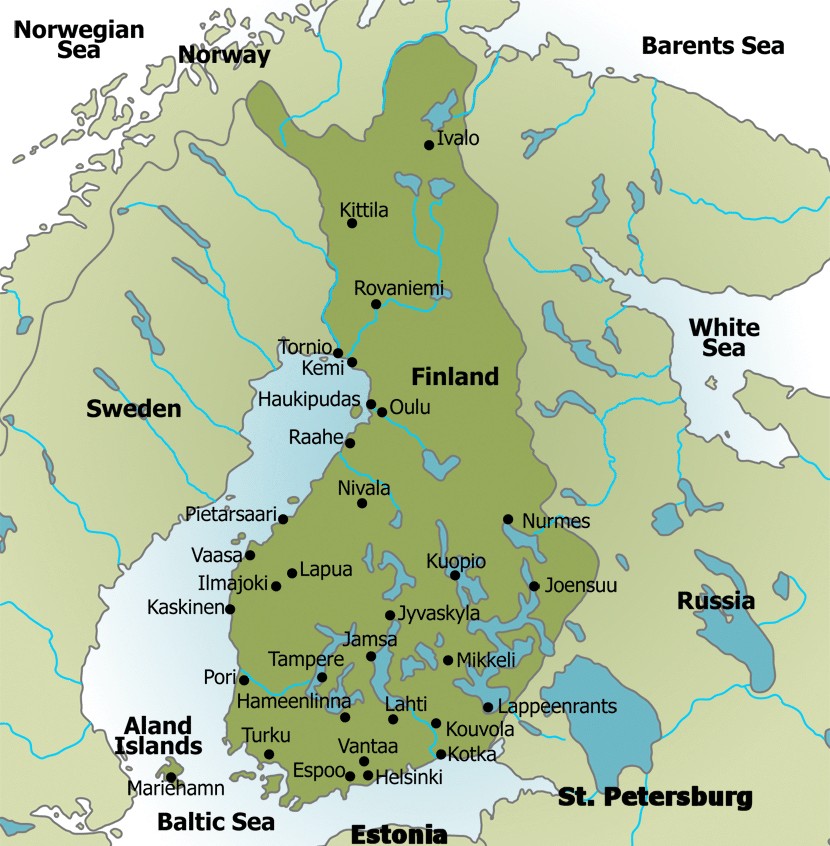 |
Finland is a marvelous Scandinavian country located in a remote
corner of civilization.
Unfortunately, the Finns don't
get many visitors. The climate is so fierce in the far north that there
isn't a great deal of traffic.
In a sense, Sweden and Estonia are Finland's only real
neighbors. However, Finland is separated from both countries
by water.
For the most part, if
the Finns want to go somewhere, they rely on ferries that
make daily shuttles between Sweden to the west and Estonia
to the south.
Finland does
actually have one other neighbor, some obscure country to
the east known as "Russia".
However, Russia is not
known to be a particularly friendly country.
Based on
centuries of cruel Russian domination, today
most Finns regard Russia with an uneasy fear.
Finland won its
independence from Russia in 1917. The head of Finland
was the Russian Tsar. When Russian rebels assassinated
Tsar Nicholas, in a legal sense Finland no longer had a head
of state.
While Russia was
fighting its own Revolution, Finland had a brief civil war
of its own. The people loyal to the Russian crown were
defeated and Finland was now free of Russia.
Finland chose to
become a democracy.
|
|
THE BITTER STORY OF WORLD WAR II
During the rise of Nazi
Germany in the 1930s, Finland was caught between a rock and a hard
spot. It had Stalin and the Soviets on the east and Hitler and
the Nazis on the west. Finland was pro-West at the time.
But the rise of Germany effectively cut off Finland from the West.
Finland was surrounded.
The Soviet Union and
Nazi Germany signed the Molotov–Ribbentrop Pact in August 1939. The
pact was nominally a non-aggression treaty, but it included a secret
protocol in which the Eastern European countries were divided into
spheres of interest. Finland fell into the Soviet sphere.
In 1939, two months
after Germany initiated World War II with its attack on Poland,
Russia decided to invade Finland. The stated reason for the
conflict was to ensure greater security for Leningrad, the Soviet
name for St Petersburg.
The Soviet Union had
decided to reconquer the provinces of Tsarist Russia lost during the
1917 October Revolution and the Russian Civil War. Finland was an
autonomous Grand Duchy within the Russian Empire from 1809 to 1918.
The Soviet Union demanded parts of Finish territory for security
reasons, primarily to protect the city of Leningrad which was very
close to the Finnish border.
The Soviet forces did
not accomplish their objective of the total conquest of Finland, but
it did gain substantial territory along Lake Ladoga, providing a
buffer for Leningrad. The League Nations was outraged and
labeled this an "illegal attack". The Soviet Union was expelled from
the League of Nations.
When Hitler decided to
break the treaty and attack Russia in 1941, Finland had suddenly
found the strangest ally of all… Germany! In a classic
situation of "the enemy of my enemy is my friend", the Finns found
themselves siding with the Nazis of all people.
|
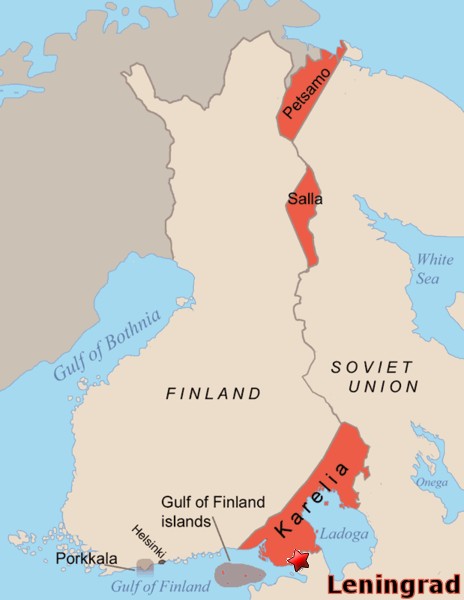 |
Finland declared war on
Russia as well and began to counter-attack.
Germany headed straight for Leningrad, the
Communist name for St. Petersburg, which is situated right on the
southeastern Finnish border. As the Germans moved
in on Leningrad from the south, Finland moved in from the north.
The Soviet Union was completely overmatched. Finland quickly
regained its lost territory.
However, the joint
Finnish-German offensive stopped at the edge of Leningrad where the
Soviets had decided to make their stand. To attack Leningrad
would be to invite severe losses.
The Germans initiated a
siege. The German siege of Leningrad lasted for 872
days!
The siege was a horrible event that
resulted in the deaths of some one million of the city's
inhabitants. In the process, the few who did survive practically
starved to death… it was so bad that humans devoured, well, I won't
say it. It was remarkable that the Russians held
on as long as they did. The siege of Leningrad
became the most lethal siege in world
history.
Meanwhile Finland was put in a terrible
predicament. They hated the Russians, but they hated the Nazis too!
The Finns couldn't make up their
minds what to do. Finnish troops controlled the areas
north the city but refused to attack
for two and a half years. Furthermore
they refused to let Germans use those areas for attack either.
All the Finns did was protect territory
that had originally been theirs before 1939.
To this day, the argument whether Finland
should have helped Russia during the siege or refused to help
remains a deeply controversial subject. After all, troops from
Leningrad had subjugated and murdered the Finns in 1940 right before
the German invasion. Finland was certainly in no
mood to come to the aid of the now-wounded aggressor.
Apparently Russia didn't
see it that way. The Soviets ignored Finland's neutrality.
The Soviets conveniently overlooked the fact that Leningrad would
have fallen without Finland's tacit complicity.
As the Soviet Army got
stronger, in 1944 Russia began to counter-attack the Finns.
Soviet air forces conducted air
raids on Helsinki and other major Finnish cities. Eventually the
Soviet strategic offensive in the summer of 1944 drove the Finns
from most of the territories they had gained during the war, but the
Finnish Army later fought it to a standstill in July 1944. A
cease-fire ended hostilities.
The Paris peace treaty concluded the war
formally in 1947.
The story of Finland and
Russia during World War II
was a very strange
situation where a big bully meets an even bigger bully, then
acts surprised when the badly abused bleeding kid next door refuses
to come to their aid.
After the war, Russia, still bitter about
the licking they took in Leningrad from the Germans while the Finns
stood by watching, basically stole about 10% of Finland's land near
Leningrad as punishment, then set the country free in disgust.
Finland ceded Petsamo
and Karelia and paid $226,500,000
in reparations to the Soviet Union. In return,
Finland retained its independence.
It was easier just to give up the territory than to keep fighting
the powerful Russian bear that now seemed hell-bent on a path to
international domination. Give the Devil his due and ask him
to go away.
|
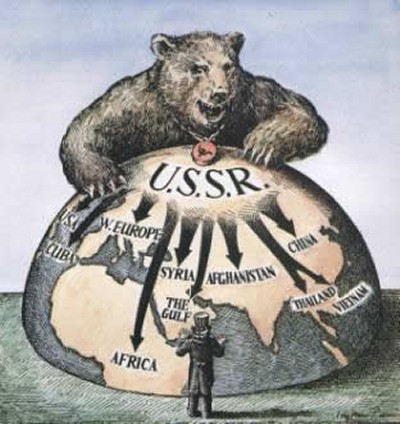 |
|
|
|
|
Today's
Russian-Finnish Border
Unlike the open borders that characterize
free travel to and from the other European countries, Russia still
guards its borders with intensity.
Why is this? What is Russia afraid of? Well, apparently Russia has a
big problem - some of its citizens want to leave the country.
Russia isn't happy about that at all.
During the Soviet era, there was a security fence along the entire
border
The fence was monitored closely throughout the Cold war. Stretching
620 miles between Russia and Finland, there were armed guards that
regularly patrolled. They would shoot first and ask questions later.
Since then, things have improved a little bit. These days, the fence
along the Finnish border is no longer quite so intimidating. Nor is
it so well guarded. Or is it?
|
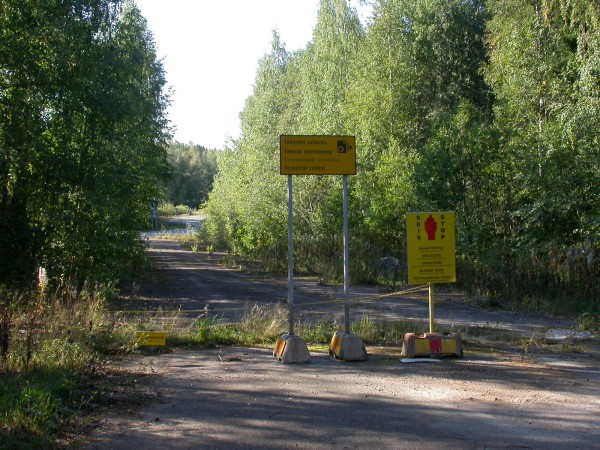 |
These
days the border is guarded with security cameras,
not soldiers.
The turning point came when Finland agreed to
send back all the Russians who escaped.
Since no one gets out of
Finland by foot and swimming to Estonia is out of
the question, Finland is basically nothing more than
a giant trap. Sooner or later all Russian escapees
get discovered by the Finnish authorities.
Since
getting caught in Finland means automatically getting returned to
Russia and sent to Siberia, Russia no longer
has much to worry about. It is fairly useless
to bother to escape unless some Finnish family is
willing to shelter a refugee.
Even
though the borders are
open now, the
fence still partly remains. It
is still forbidden according to Russian law to pass
the border except through a border station.
However hunters cross the border from time to time
without penalty (unless they are caught by the
hidden cameras).
|
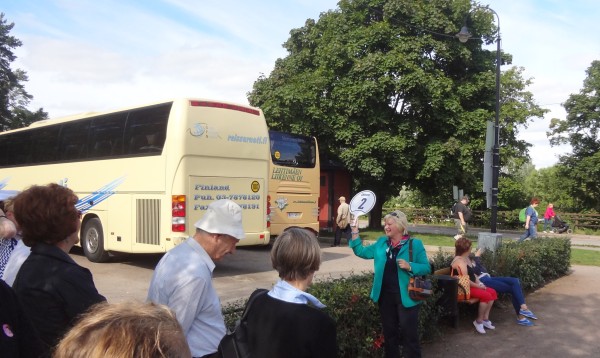 |
Since
there are so many people with relatives on either
side of the border, there is sporadic traffic
between the countries. However the crossing is
tense like the US-Mexico border, not relaxed like
the undefended US-Canadian border.
For the
record, the US and Canada share the longest
undefended border in the world. I guess we can
all be thankful we have our Canadian friends to the north and not
Russia.
As
Karin, our travel guide, put it, she could visit
Russia if she wanted to, but no one in Finland
actually wants to visit the place for any reason
other than business.
Karin
claims Russia is such a lousy place to live that
even the Russian bears try to escape to Finland.
She said the Russians even demand the Finns return
the bears too.
I think she was kidding.
|
Notes on a divided Europe from the
Finnish frontier
13
June 2012, Financial Times
Greetings from Lappeenranta, in eastern Finland!
Everyone is talking about the euro crisis, and
the divisions between northern and southern
Europe.
But
another European border is more evident here.
The frontier between eastern and western Europe
has been bitterly contested for centuries.
In the 20th century, argument over the location
of that border cost upwards of a 100m lives.
Timothy Snyder’s recent book, Bloodlands,
recounts the tragedy of the contested areas in
horrific detail.
From
1948 to 1989, the border was as far west as it
has ever reached following Russia’s victory in
the Great Patriotic War.
|
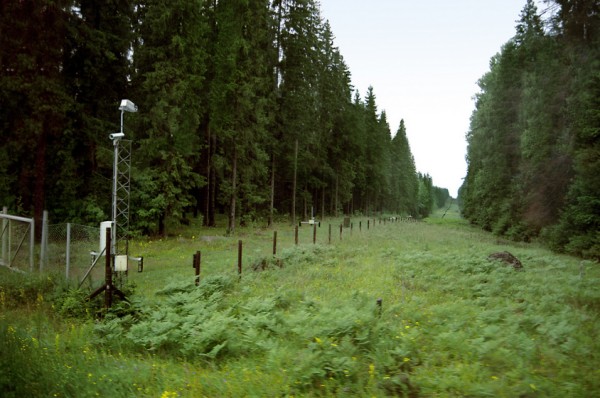 |
Today the border has shuffled far to the east.
America won the cold war and many Soviet
satellite states were rapidly welcomed into the
EU. But the line remains uneasy. Poland, the
Czech Republic and Slovenia seem fully attached
to the western side, while Hungary is regressing
towards totalitarianism. Several states further
east are still uneasy partners in the new
Europe.
The
Finnish border is an anomaly. In 1918 the Finns
won independence for a state that extended to
the gates of St Petersburg. Russia captured
territory in the 1939-40 Winter War. Finland
fought on the losing side in the second world
war and remained neutral in the cold war. So the
once thriving Finnish industrial city of Viipuri
is today the depressed Russian outpost of
Vyborg.
A cynical commentator on 20th-century history
might observe that the political ineptitude of
Kaiser Wilhelm and subsequently of Adolf Hitler
brought America in on the opposite side of
Germany’s quarrel with Russia in 1917 and 1941.
Only when the democratic politicians of modern
Germany made the rational alliance did Finland
achieve the favorable political and economic
outcomes it now enjoys.
To
pass the watchtowers and barbed-wire fences on
the Finnish-Russian border is to be reminded of
how fragile, and how recent, are the stability
and security Finland takes for granted today.
The razor wire kept Russian citizens in when the
living standards of planned societies and market
economies diverged. But now the border is easy
to cross and the gap in per capita income has
narrowed, though not by much. The very different
income distributions of egalitarian Finland and
inegalitarian Russia can be seen in the car
parks and designer shops of Lappeenranta.
In the Soviet era, Finland produced Marimekko;
Russia made no clothes any fashion-conscious
woman would want to buy. Post-Communist but
still autocratic Russia made surveillance
equipment; democratic Finland led the world in
mobile phones. Today Russia’s geeks hack into
your bank account, while those of Finland
develop Angry Birds.
The pristine countryside of Finland contrasts
with the degraded physical state of much of
Russia: a demonstration of the unexpected
finding that regulated democratic capitalism
preserves the environment more successfully than
any other system of government.
|
The Bus Ride to Porvoo
Several
members of our SSQQ group signed up for a bus ride
into the Finnish countryside to visit the town of
Porvoo. The trip took about an hour.
We
discovered we had an extremely entertaining
tour guide. Karin was a well-dressed,
highly confident woman who possessed a sharp tongue.
You might say Karin was opinionated, but she had
such a clever way of making her points that I found
her very interesting. Her acid comments made
the bus ride to Porvoo go much faster.
So who
exactly did Karin pick on? Well, Russia was not spared in the least. Russia was
described as the two ton bully that no one likes. She depicted Russia as a
cynical, suspicious, loveless, dog-eat-dog society.
Even to this day, its people are terrified of authority, scared to speak up,
and haunted by memories of the Cold War era where
the citizens were terrorized by the secret police.
Karin
clearly did not like Russia one bit. In her
mind, she could not think of a single reason to
visit the place. She concluded that vodka is
the only thing that keeps the misery in check for
many in this godforsaken land. I think she was
serious.
|
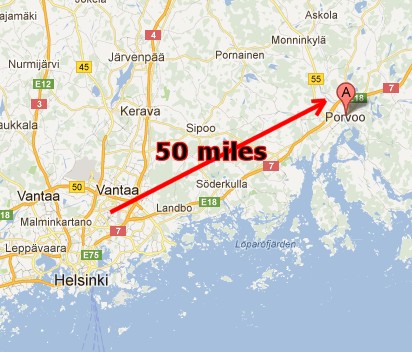 |
Sweden
Karin
had lots to say about Sweden too.
Sweden is
Finland's major rival in the world. The two
countries compete in everything, especially in
sports.
|
Ice hockey is the main event in this
part of the world.
Karin
frowned because Sweden usually has the upper hand
due to its larger population. An estimated 5.4
million people live in Finland.
Sweden's
population of 9.5 million isn't crowded by the
standards of the rest of the world, but that's a big
difference in the eyes of the Finns.
Since Finland is
the eighth largest country in Europe in terms of
area, it is easily the most sparsely populated
country in the European Union.
I found
it interesting to note that both Norway and Denmark
also have populations around 5.5 million people.
Given
Sweden's traditional dominance in ice hockey, Karin
was especially happy to explain that Finland is now
the current world champion. And guess who they
beat in the Finals? Yeah, I know, the picture
probably gave it away.
Karin
beamed as she pointed out Finland didn't just "Win",
they absolutely crushed their arch rivals for the
victory.
I can
certainly see why she is proud. Apparently the
Swedes enjoy a 40-11 advantage over Finland.
For that matter, Finland has only won the World
Championship twice. Their last victory came 17
years ago in 1995.
By and
large, Karin wasn't too hard on Sweden. She
just said that Finland gets tired of being the
underdog all the time. On the other hand,
while the Swedes are their greatest rivals in the
world, they are also Finland's best friends.
The two countries operate like bickering brothers.
|
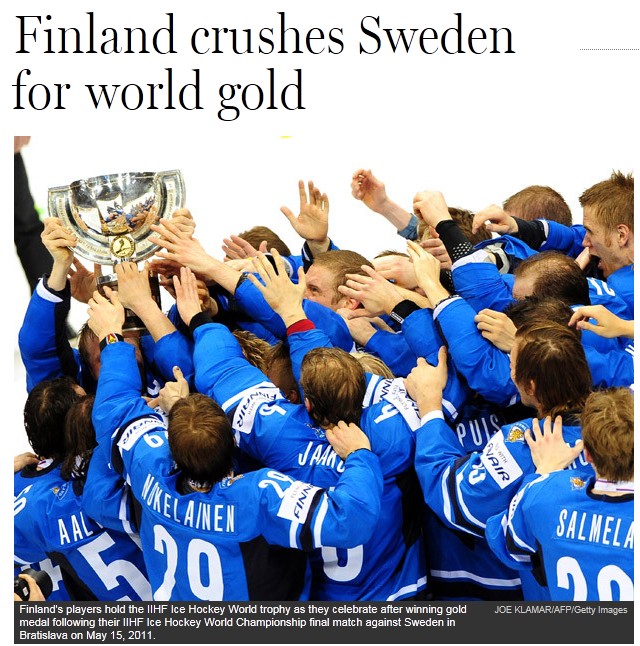 |
|
Finland and the Sauna
Karin's favorite
subject was "Sauna". She made it very clear that
Americans do not pronounce it correctly. The Finns
call it "Sow-na" like a pig sow, not "Saw-na". For
some reason, Karin was quite particular that we get this
right. She asked us to repeat it several times.
I could not help but wonder if she was a former school
teacher.
Karin made it
clear that the tradition of "Sauna" belongs to Finland and
NOT to Sweden. Any Swede who claims the Sauna started
in Sweden is a big liar. I told you Karin didn't mince
words!
Finland is one of the world's wealthiest nations. Poverty is
almost unheard of. Its citizens have a per capita
income of $49,349. Finland has built an extensive welfare state
to care for its people. It is a European leader in
economics and politics. Karin groused that wealthy
Finland is basically paying the bills for profligate Greece,
the European bad boy. With the best educational system in
Europe according to some measures, the Finnish people are
extremely well-informed. Finland enjoys its high
rank as one of the world's most peaceful and livable
countries.
As a consequence
of all this affluence, everybody who is anybody owns a
country house on the lake. And each lake house invariably has
a sauna.
Saunas play an
integral part in the way of life in Finland. They are found
on the shores of Finland's numerous lakes as well as in city
homes and private apartments. The sauna is an important part
of the national identity. Those who have the
opportunity usually take a sauna at least once a week. The
traditional sauna day is Saturday. Karin explained
that the Finns have built an entire lifestyle around the
Sauna. Families take turns visiting each other's
sauna.
|
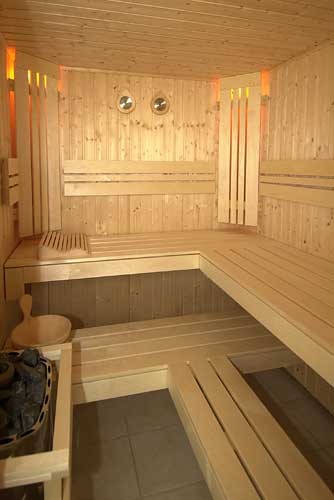 |
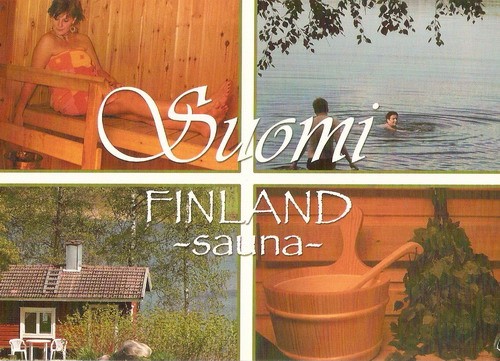 |
Karin explained
that a typical Sauna Saturday revolves around sausage, beer,
sauna, lake.
They will spend
an entire day rotating between sausage and beer, sweating in
the sauna, then jumping in the freezing lake to cool off.
Then
they start the cycle all over again... all day long.
Although
everyone is supposed to go in there naked, apparently there
is very little hanky panky that takes place. I
wouldn't know. I am just reporting what Karin told us.
I read on the Internet that men and women typically don't go
in together but rather take turns.
Karin also had
something to say about birch leaves that are used in saunas
to slap oneself to promote blood circulation and cleanse the
skin.
I was quietly
going to sleep about this point in the conversation when
Karin brought me back to full alert with a bizarre story.
She talked about a
recent sauna endurance competition that left one man dead and another
in a coma. Karin's story was so weird that I thought
she was either joking or at the very least wildly
exaggerating. The whole idea was preposterous.
|
However, when I
came back home I was astonished to find Karin had told the
story exactly as it occurred.
As it turns out,
the Finns have a well-deserved reputation for quirky
contests. The sauna endurance
event was another of those strange Finnish sports - along
with mobile phone throwing, wife-carrying, and swamp
football - that periodically nudge the country across the
international news threshold whenever
journalists have nothing better to write about.
Sauna endurance
contests began back in 1999. The Finns have won
practically every year. The sauna is typically heated
to 110°. A pint of water is added to the stove every
30 seconds to create intense steam. The last person to
remain in the sauna is the winner. This sport is not for
sissies. Amateurs usually give up after 3 minutes in
complete despair. The victor lasts about 12 minutes.
On 7 August
2010, both Vladimir Ladyzhensky, the Russian finalist and
former third-place finisher, as well as Timo
Kaukonen, Finnish five-time champion, passed out after just six minutes in the sauna.
|
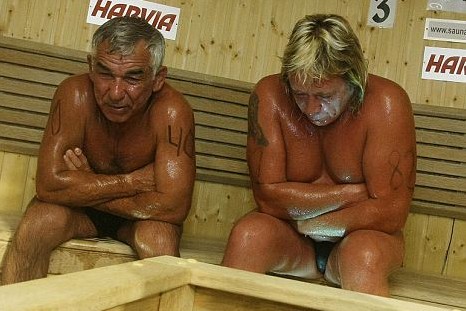 |
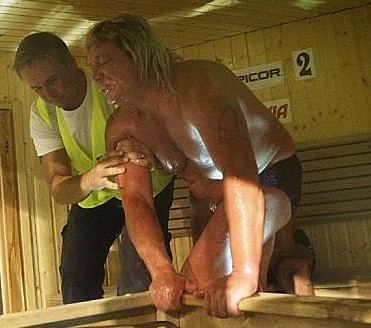 |
The contestants
are supposed to give a thumbs up signal every 20 seconds or
so. When the judges did not see either man move, they
panicked. They opened the door, rushed in and dragged
both men out. They were horrified to discover the
Russian was already dead.
Kaukonen, the
defending world champion, was in bad shape too. He suffered burns all over his body.
The Finnish man took this competition so seriously that he
had nearly killed himself trying to outlast a dead man! He
had refused to leave the sauna despite getting sick. Kaukonen simply refused to quit.
Of course he had no idea the poor man was dead.
Kaukonen was
rushed to the hospital. His condition was described as
critical, but stable. He was placed into a medical
coma to help him withstand the pain. Kaukonen woke up
from the coma two months after the event. His respiratory
system was scorched, 70% of his skin was burnt and
eventually his kidneys failed as well. However, Kaukonen was
a tough guy. Once he regained consciousness, he was
reported to be recovering quickly.
After the
tragedy, people began to ask questions. What went
wrong? No one was sure. Typically the
contest is over at 12 minutes, but these men had only made
it to 6 minutes!!
|
Just a few
minutes before the finals, Kaukonen had told the Norwegian
newspaper Verdens Gang that the saunas used for the
2010 championship were a lot more extreme than the saunas
used for previous competitions. However, his
observation was not confirmed.
The judges
measured the temperature, but found nothing wrong. The
temperatures inside were no different than previous
competitions. Furthermore, when the police investigated,
they could find nothing wrong either. No one was ever
charged of any wrong-doing. It was ruled an accidental
death.
Ironically,
since both men were disqualified for not leaving the sauna
unaided, third-place finisher Ilkka Pöyhiä became the
winner.
There is a very
strange footnote to this story. Ladyzhensky, the
Russian, had tried to cheat. His autopsy
concluded his death was aided by strong
painkillers and local anesthetic grease on his skin.
|
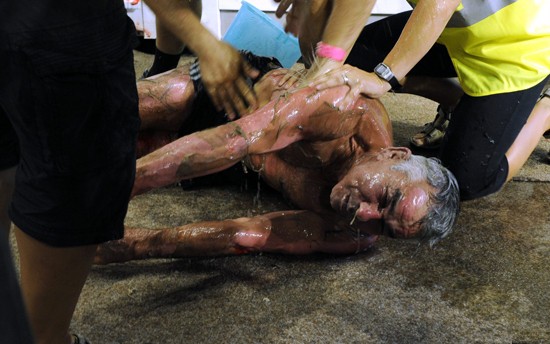 |
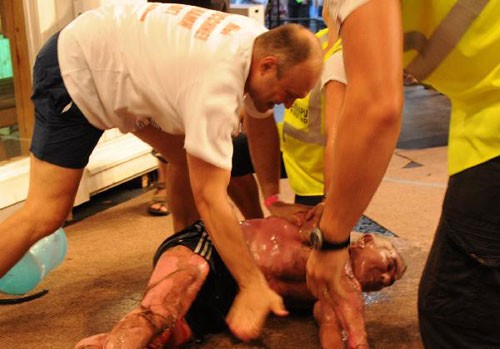 |
Apparently the
Russian had tried to cheat by using drugs plus external creams that would reduce
the pain. This in turn kept his pores from operating
properly. The Russian's gimmick directly contributed
to his death.
The "Darwin
Awards" people chortled. To their twisted way of thinking,
this guy had done society a favor by removing himself from
the gene pool. Obviously these people never saw the
pictures of the charred skin. If they had, maybe they wouldn't have
laughed so loud.
I have one last
thing to add: I was shocked to discover that 110° was not
what I thought it was. I have walked in Memorial Park
at 100°, so I know this temperature is searing. But
then I figured it out: that's 110° Centigrade.
The sauna temperature was actually 230° Fahrenheit!!
Water boils at
212 degrees Fahrenheit. Walking into that sauna had to
feel like walking into Hell or climbing
into your own personal pizza oven and closing the door.
These Finnish people are a strange breed indeed.
|
HAPPY
HAPPY HAPPY
After Karin
finished telling us about Russia, Sweden, ice hockey and sauna, next she
moved on to Denmark. Karin was miffed that the Danes
are always bragging about the study that showed Danish
people are the happiest people in the world.
In April 2012, a
158-page report published by Columbia University's Earth
Institute reported that Denmark had taken the top spot on
the United Nation's first ever World Happiness Report,
followed by Finland, Norway and the Netherlands.
Karin, obviously a highly competitive woman, noted that
Finland had finished in the second place. She felt robbed.
She said this conclusion was a mistake. Karin stated,
"Everyone knows that Denmark has one of the highest suicide
rates in the world! How can those Columbia people
arrive at such a ridiculous decision?"
I laughed. Talk
about sour grapes! Maybe I should have reminded Karin
that she could have been born in Botswana, Africa, a
habitual last-place finisher in this study.
|
 |
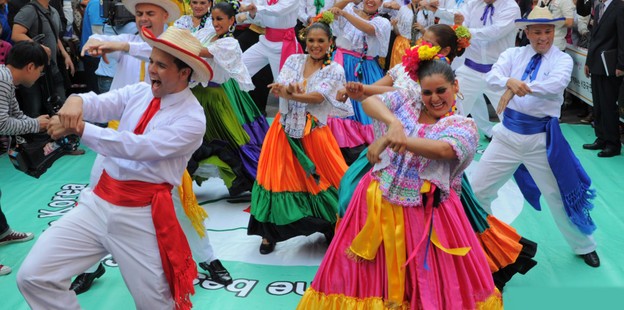 |
As it turns out,
there is an odd twist to this story. When I went to
research Karin's remarks, I learned that a new study has dethroned
Denmark. Denmark is no longer the happiest country in
the world. I am sure that would make Karin happy.
Actually, Karin may have gotten it right. According to
a new global happiness measurement, the "Happy Planet Index", Denmark
is far from being happy!
Surprisingly, in
this study, the typical
happy frontrunner is
now ranked 110th.
Costa Rica is the new leader. The Costa Ricans have
been declared the merriest in a list of 151 countries. Woowee!
In second place,
Vietnam! Vietnam?? Yup, Vietnam. I was
about to shrug my shoulders and move on, but then I decided
to take a second look at the rest of the countries.
|
I guess my first clue that this new study borders on the
absurd came when I saw Jamaica listed in Sixth Place.
Hey mon, no way!
Oh sure, the
travel commercials depict the Jamaicans as a bunch of carefree "don't
worry be happy" reggae singers full of dance and joy.
However, one look at the giant potholes in the streets gives a
much different picture. I suspect the Jamaicans smoke weed
for the same reasons as the Russians drink vodka. This
poverty-stricken Caribbean island has one of the lowest
standards of living I have ever seen. Everywhere I go, there
are beggars in great need.
In fact, this
whole list is weird. Third place Colombia is
the drug-infested cocaine capital of the world. Home
to
Pablo Escobar, Colombia has seen some of the worst violence in the
Western hemisphere. Haven't these people heard of FARC,
the Colombian leftist rebels who have kidnapped countless innocent
people, assassinated others, and engaged the government in
50 years of guerilla warfare?
Belize is dirt
poor. So is Honduras. The toughest gangs in LA
come from El Salvador. Bangladesh is one of the most
over-populated, underfed countries in the world.
Millions die every year due to flooding in the rainy season.
Pakistan is home to the worst terrorists in the world.
Are these Happiness people out of their minds?
Gee, I think I'm
starting to sound like Karin.
|
Happiest countries on the planet (score):
1. Costa Rica (64.0)
2. Vietnam (60.4)
3. Colombia (59.8)
4. Belize (59.3)
5. El Salvador (58.9)
6. Jamaica (58.5)
7. Panama (57.8)
8. Nicaragua (57.1)
9. Venezuela (56.9)
9. Guatemala (56.9)
11. Bangladesh (56.3)
12. Cuba (56.2)
13. Honduras (56.0)
14. Indonesia (55.5)
15. Israel (55.2)
16. Pakistan (54.1)
16. Argentina (54.1)
16. Albania (54.1)
19. Chile (53.9)
20. Thailand (53.5)
|
Finnish Husbands
|
|
Here is a picture of a
Finnish wife carrying contest. We will get to that story
shortly.
Given that Karin had an
opinion on everything, it was no surprise to any of us when she
eventually got around to discussing Finnish men, a group that
includes Finnish husbands as well.
According to Karin,
there are two basic themes when discussing Finnish men... they are
taciturn and they are stupid. Karin sprinkled her conversation
with jokes to illustrate her point.
Q: How do you know
when a Finnish man is madly in love with his wife?
A: He almost tells her.
Here's another one.
Jukka wanted to
propose to his girlfriend, so he asked his father how to do it.
"Father, what
did you say to Mother?" asked
Jukka.
"Nothing."
"I know that, but what words did you
use?"
Here is one Karin told
that actually made me smile.
The Finnish wife
couldn't take her husband's perpetual silence any more, so she
orders him to go see their minister together.
The wife tells the
Minister, "Herkko, my husband, he never speaks to me! I
don't think he loves me anymore!"
The minister looks
at Herkko, "Is this true?"
Without saying a
word, the husband shakes his head no. The minister is
confused by the response.
"Don't believe him!"
the wife blurts out, "He hasn't told me he loves me in 25
years!"
The minister says, "Herkko,
is this true?"
Exasperated, Herkko
clears his throat and
speaks up.
"On the day we
married 25 years ago, I told my wife I loved her. And I
promised her I would let her know if anything changed."
|
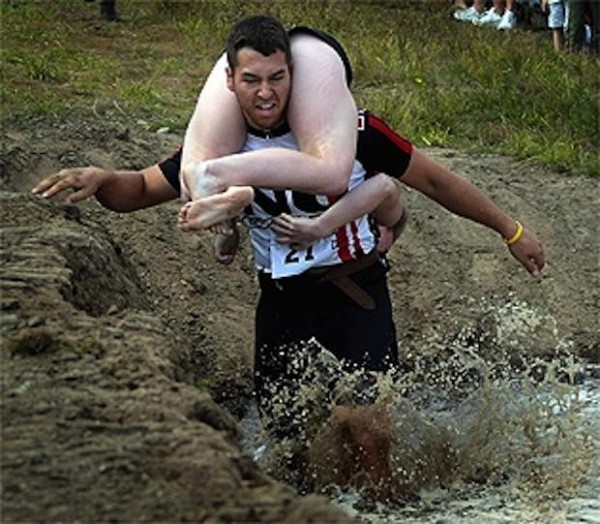
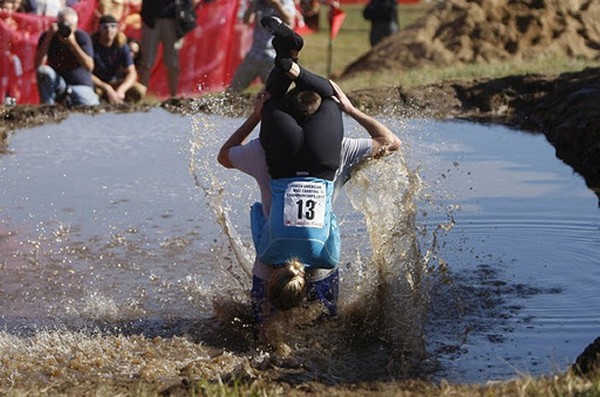 |
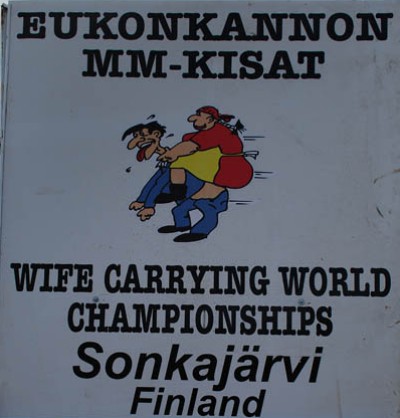
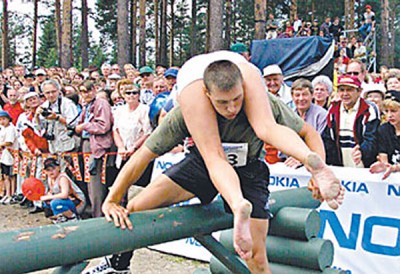
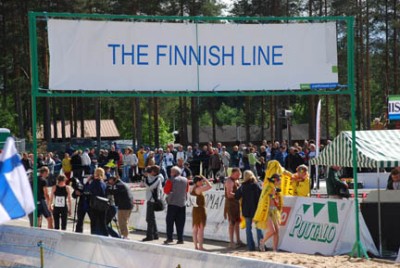 |
When it comes to studying Finland's romantic rituals, nothing can
be much stranger than the bizarre wife-carrying competitions.
This tradition definitely began in Finland.
Not
surprisingly, Karin had something to say on the matter.
She
theorized that the Finnish wife-carrying tradition is a 'throwback'
(small pun) to the days of the caveman.
That's when a brute would find a
woman, grab her by the hair, and haul her off to his cave kicking
and screaming.
|
 |
Karin
postulated that since Finnish men have absolutely no social skills,
the only way they could get a woman was to steal one. This
meant they had to raid remote villages, throw a woman on their back and
travel long distances.
I asked why long
distances? Karin replied that if it was a short distance, then the captured woman
would surely escape and try to find her way back home.
Karin
added with a smile that over the centuries, genetic selection
favored any man who could carry a woman for miles on his back.
Hence modern Finland is populated with men who don't talk and have a
secret urge to throw their wives on their backs!
Listening
to Karin, I wasn't sure if she was teasing or serious. She
didn't seem to hold Finnish men in much regard. However, at
the same time, Karin was genuinely proud of her country and its oddball
traditions. Karin clearly understood that
Finland is "different". She didn't mind entertaining us with
anecdotes that poked gentle fun at her country's unique culture.
I got the
sense that Finland feels isolated from the rest of the world.
Finland is pretty much all on its own in this remote corner of
civilization. Take Copenhagen for example. Denmark sits right at the
crossroads between continental Europe and Scandinavia. Cars
from Germany can actually drive across Denmark into Sweden and vice
versa. All shipping to and from the Baltic Sea has to pass
through Denmark. Over the centuries, Copenhagen has become a
"party town" due to all the constant traffic. Today Copenhagen
serves as the unofficial social capital of Europe.
Unfortunately for Finland, it takes serious work for any visitor to make it all the
way over here. Karin admitted that practically
no one emigrates to Finland even though it is a country with many
blessings. Alas, when given the choice between the
sun-kissed coastlines of the Mediterranean countries and the frozen
forests of Finland, Karin is realistic. She believes the
ever-present cold, the harsh climate, and the feelings of isolation
pose a real hardship for anyone who did not grow up with this Nordic
lifestyle.
Karin
said that during the winter, it's really tough to get out and about.
That's when the isolation can get to a person. Obviously one
of the ways to cope with the loneliness and the admitted national
tendency toward silence is to develop a quirky sense of humor.
|
Porvoo
After an hour's ride, we finally made it
to the village of Porvoo. As the pictures show, Porvoo
is a lovely countryside hamlet situated on the banks of a
river.
As it turned
out, there was nothing particularly dramatic to see.
No gardens, no parks, no ruins, just comfy houses and lots
of shops. Porvoo is attractive, but not spectacular.
Most of us spent
the morning wandering around and visiting the various shops.
I bought a moose; Marla bought an ornament. Then it
was time for a lovely walk. Believe it or not, we were
late back to the bus. Shockingly, it wasn't even my
fault.
|
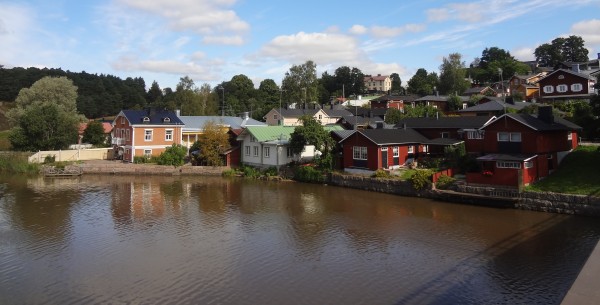 |
| |
|
Lunchtime!!
The highlight of our day
took place at lunch. We were taken to a country estate that
had a restaurant down in a dark, windowless wine cellar.
Talk about atmosphere!
This cozy, candle-lit dining room was wonderful. In addition,
the food was awesome. Best of all,
they served beer!
Pretty soon we were all smiling.
That's Marsha, Sandra in
black, Velma with the hat, Marla, Susan, and Wendy.
This was the perfect chance for us to hang out together.
We had a ball. The seven of us had spent a lot of time together back
in Copenhagen.
Our little group would go on to
share tomorrow in St Petersburg and the following day in Tallinn,
Estonia, as well. By the end of the trip, we were a tight-knit group.
Here are some pictures
of the estate and the surrounding farm lands.
|
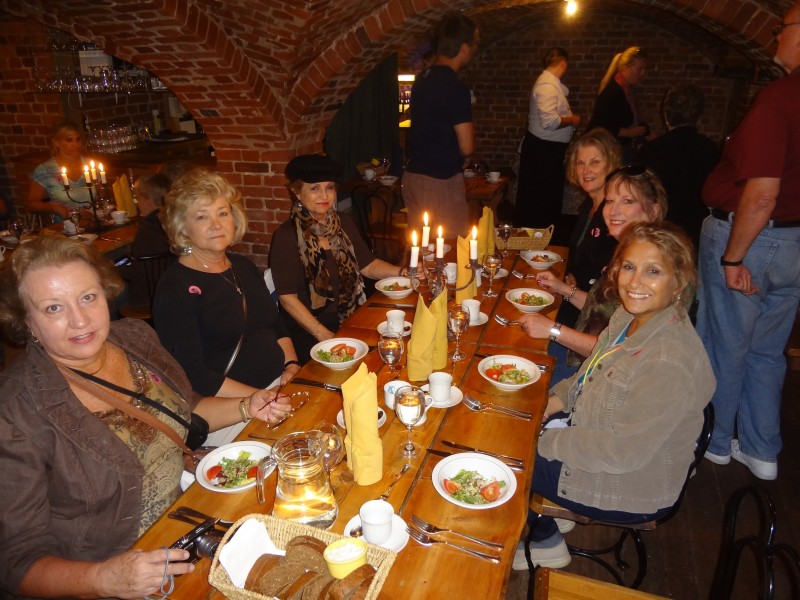 |
| |
|
Rock Church
After lunch, we drove
back to Helsinki. We were dropped off at a very unique church
that was carved out of rock.
The Temppeliaukio 'Rock
Church' is one of Finland's most popular tourist attractions.
It is also one of the
most respected examples of modern architecture in Helsinki.
Quarried out of the
natural bedrock, the church is bathed in natural light which enters
through a glazed dome.
The church is frequently
used as a concert venue due to its excellent acoustics.
I thought the place was
very cool. As churches go, a big thumbs up for this place.
Aha, a picture of the
Gang outside the Rock Church.
This was a fun day.
|
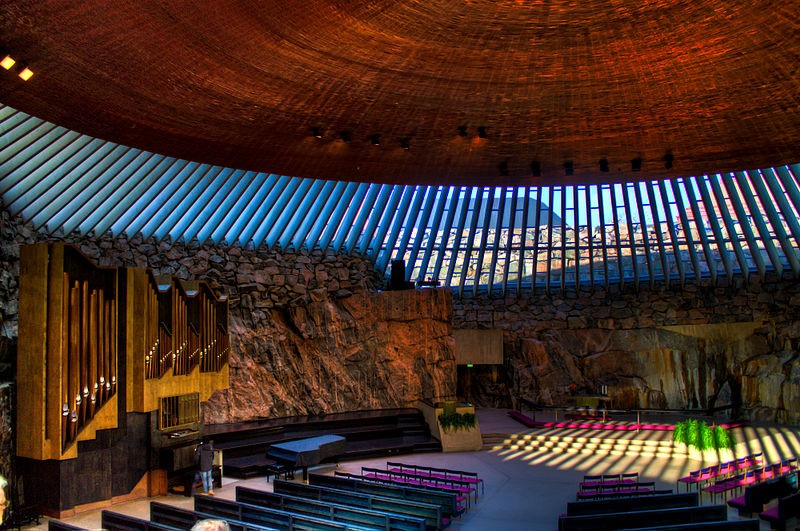
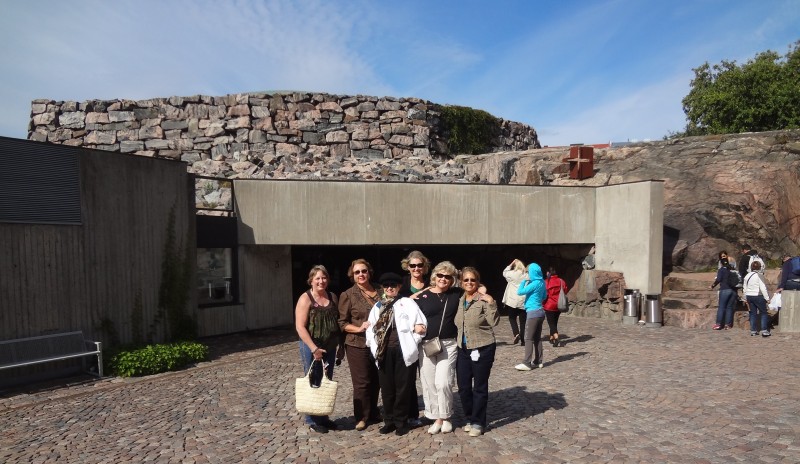 |
| |
|
Helsinki
Church
Our final stop of the
day took us to the impressive Helsinki Church.
This magnificent
structure towers high above the cityscape thanks to being built on a
hill. No flooding problem for this structure.
There are about 80 steps
in that picture. I remember some serious huffing and puffing
during my climb to the top. It was worth it. What a
view!
The church overlooks a
magnificent square below. The Square was very busy. Take note
of all the tour buses surrounding the square.
This was our last stop
of the day.
|
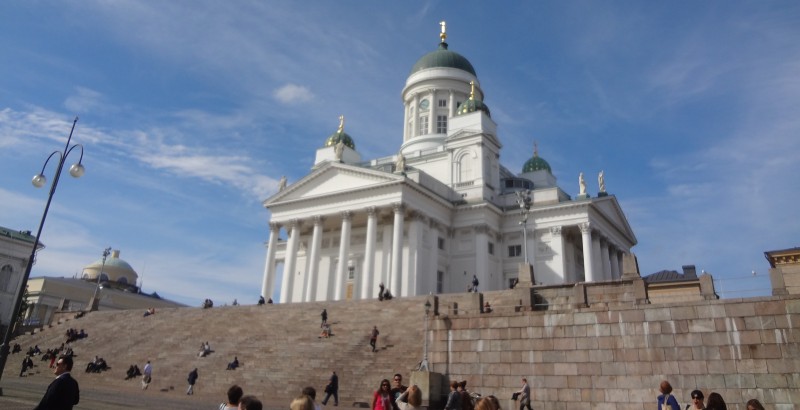 |
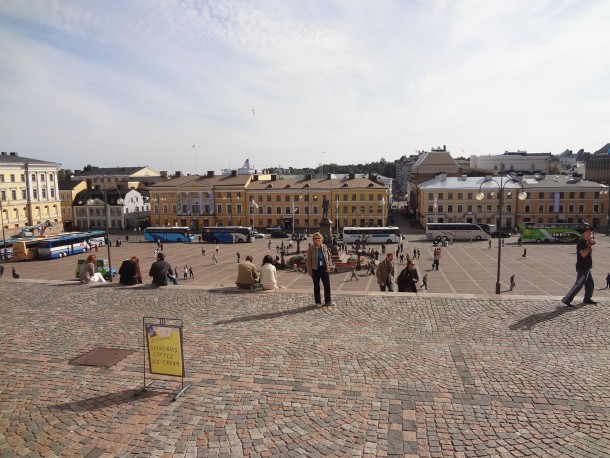 |
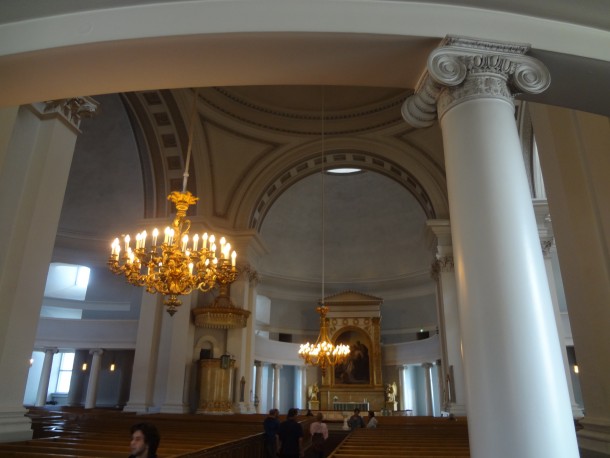 |
| |
|
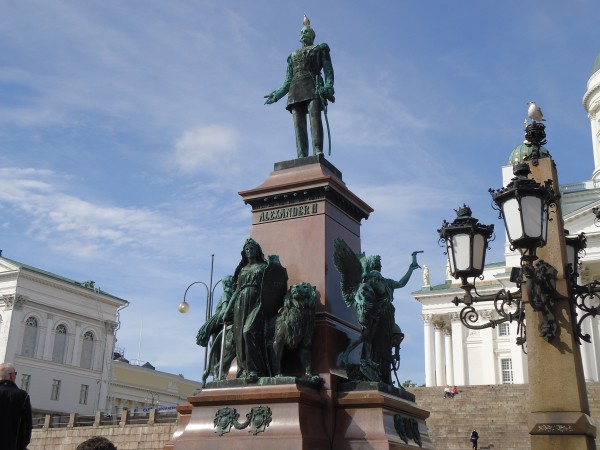 |
This
statue of Russian Tsar Alexander II rests in the giant square below
the Helsinki Church. Alexander is known as "The Good Tsar"
here in Finland.
Due to
its sparse population, the Finnish people were easily subjugated by
both Sweden and Russia throughout its early history. Finland
was just a mere pawn as these
two superpowers took turns telling the Finns what to do.
Alexander
gave Finland a great deal of autonomy during his reign from
1855-1881. He strongly encouraged the people to speak their
own language and develop their
own national identity.
Finland
would eventually break free from Russia during the 1917 Russian
Revolution.
According
to Karin, Alexander was right to tell the Finns to become their own
nation, but he should have encouraged them to adopt a different
language.
Today
everyone agrees the Finnish language is one of the most difficult
tongues in the world to learn. Karin suggests the language is
so hard that the men can't figure it out. That's why they
never say anything. Ouch.
|
While we were at the Rock Church, Karin told me a complicated joke
about the legendary dopiness of the Finnish men. I didn't
completely understand the joke at the time, but I was able to find
it on the Internet.
The Finns were
busy fighting the Russians; each army
was entrenched not far from the other. It
had been quiet lately; no shots had
been exchanged for some time.
The Russians
were getting tired of this. They wanted
to go home. So they devised a plan. Since
'Toivo'
was a common Finnish name, a Russian soldier would shout "Toivo!"
out loud.
The plan
worked. Every time a Russian
soldier would shout "Toivo!", some ignorant
Finnish soldier named Toivo would respond by standing up,
giving a salute and answering "Ya?"
Then he would be shot
by a Russian sniper.
This happened
several times before the Finns finally caught on. The Finns
decided to use the same trick. They
would shout out "Ivan!". Surely
there would be some Russian
soldier named Ivan who would stand up and
let them shoot him.
So
a Finnish soldier shouted "Ivan!"
From the
Russian trench, a voice yelled back, "Hey,
is that you, Toivo?"
Toivo immediately stood up. "Ya!
How did you know?"
Bang!
|
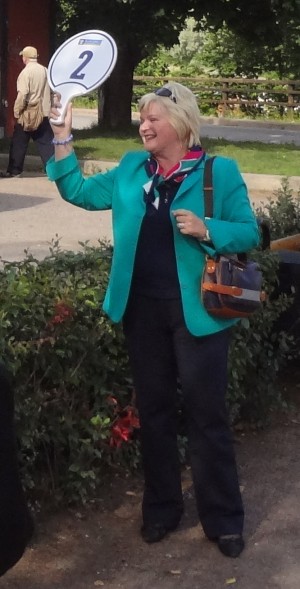 |
|
I thought this was a
strange story.
Karin shared it with me while we were waiting
for the group to finish exploring the Rock Church. I wasn't
quite sure why Karin told it to me. I knew
we had a rapport of sorts since I had asked her several questions
throughout the day. Maybe she was just killing time.
|
Based on the punch line
and her earlier riff about the silence of the Finnish men, I was
left with the impression that Karin didn't hold the men of her
country in particular high regard.
It is strange how one
person like Karin can shape my perception of this entire country. Now I wondered if all the women of Finland dominate their passive men
or whether Karin was an exception. She definitely
had a strong personality. I could see any man being intimidated by
her sharp tongue, including me.
Karin had chewed Marla
and me out for returning to the bus late when we were in Porvoo.
In all my years, I don't recall any guide addressing me with the
intensity Karin used.
Despite this odd ending
to the day, I will remember Karin as one of the most interesting
tour guides I have come across. She would stand in stark
contrast to the incompetent tour guide we would have tomorrow in Saint
Petersburg.
Helsinki was by and large a
very pleasant day for me. Nothing too exciting, but fun
nonetheless. Sandwiched between my big day yesterday in
Stockholm and my big day tomorrow in Saint Petersburg, this was the
perfect way to get a little rest.
|
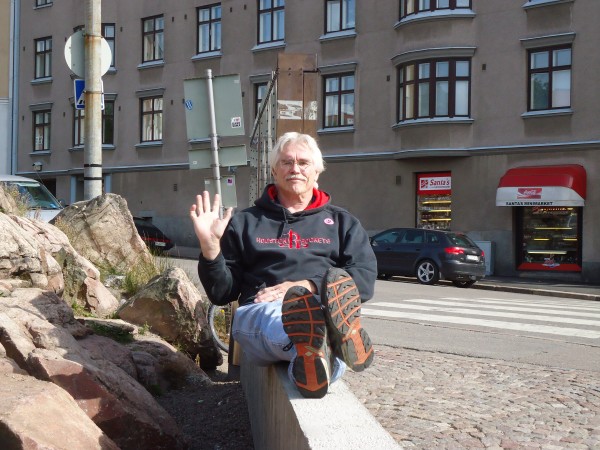 |
|